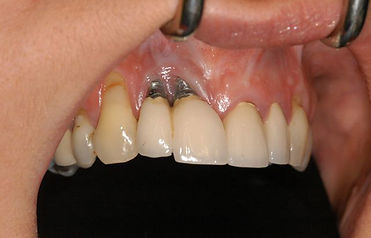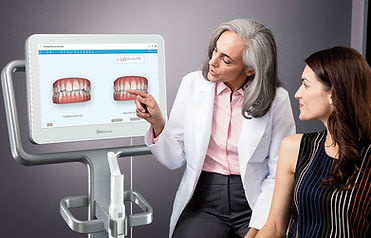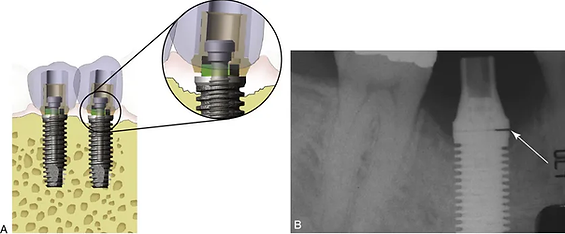- Monday- Friday 10:00 AM - 6:00 PM / Saturday 9:00 AM - 3:00 PM
- 5200 S Archer Ave, Ste 3 Chicago, IL 60632
- Home
- About Archer Dental
- Archer Dental Savings Club
- Special Offers
- Laser Dentistry
- General Dentistry
- Cosmetic Dentistry in Chicago
- Medicare Dentist in Chicago
- Diagnostics
- Dental Cleaning
- Composite Fillings
- Nitrous Oxide
- Bruxism
- Crowns and Bridges
- 3D Cone Beam
- Wisdom Tooth Extractions
- Atraumatic Extractions
- Laser Dentistry Chicago
- Teeth Whitening
- Veneers Dentist Near Me
- Chicago Dentist
- Cracked Tooth
- Implants
- Invisalign
- Braces
- ITero Scanner
- Emergency Dentist
- Contact Us
- Sleep Apnea Treatment
Causes of Dental Implant Failure
Dental implants and All-On-Four full mouth restorations have a lot of benefits. Most importantly, they can give you a new beautiful smile, enhance the quality of your life, while looking like your natural teeth. Generally, dental implants have a very high success rate, when done properly. However, there are some factors that can lead to failure of dental implants. Although it is not common, it is possible, and it can lead to complications and cause discomfort.
This article will help you understand what are the most common reasons for failed implants and what we do to prevent implant failure. Also, this information will be helpful for those, who already have dental implants and are looking for a dentist who will treat patients with failed implants.
Signs of implant failure
The following are the most common signs of dental implant failure:
- Chewing difficulties
- Inflammation of the gums
- Recession of the gums
- Irritation and/or swelling
- Implant shifts or becomes loose
- Discomfort or intense pain
- Foul or metallic taste on the side of the implant (due to pus)
There are various factors that can cause dental implant failure. Health of the patient and adherence to the post-op instructions play a major role. Competent and skillful dentist is also imperative for a successful implant procedure. In the rest of the article we discuss the main reasons for failed implants and what we do at Archer Dental when a patient comes in with a failing dental implant.

Misalignment of dental implant
Positioning is a very important and challenging aspect of implant dentistry. The implant must be fully surrounded by bone, but sometimes the preferred position in the bone is not suitable for the implant. Positioning implants and crowns involves using very precise measurements. If the implant is misaligned, it will affect the patient’s aesthetics and bite. It can cause crowns to look unnatural, recession of the gums and expose the metal of the implant underneath the gum.
Saving implants that are misaligned can be difficult. Removing the implant can cause damage to the bone or adjacent teeth. That’s why getting it right the first time, choosing a dentist with experience and proper knowledge is key.
Inaccurate impressions
Many dentists still prefer taking analog impressions and physically sending them to the laboratory for the crowns to be made. However, traditional impressions can be slightly inaccurate. Even a small error can affect how the crown will fit. Small mismatches can create space between the gum and the crown. This can be problematic, because bacteria can enter through the gap, leading to infection. Infections can be treated, but it might require implant replacement as well. In order to avoid this problem at Archer Dental, we have certain procedures in place to ensure that our impressions are as precise as possible. Also, at Atcher Dental we do digital impressions using iTero 3D scanner. Using this latest dental technology allows us to reduce the risk of ill-fitting crowns and gives us exceptionally accurate fitting restoration.

Peri-implantitis
Another common cause for implant failure is peri-implantitis. Peri-implantitis is an infection of the gum tissue around a dental implant. The inflammation is caused by plaque buildup that contains bacteria along the gums and implant.
Signs of peri-implantitis:
- Gums around implant are red
- Gums around implant are receding
- Gums bleed during teeth brushing or flossing
- Formation of pockets under the gum
- Implant feels loose
- Implant post is exposed
- Metallic or foul taste
- Pus coming out from the pocket
It is important to note that patients with diabetes, periodontal disease, smokers, and those with bad oral hygiene are most susceptible to bacterial infection or peri-implantitis. When signs of peri-implantitis start to show, the dental implant is at risk of failing. That’s why it is so important to look for an experienced dentist that treats peri-implantitis or failed implants. Thankfully, Archer Dental in Chicago has technology and experience to treat peri-implantitis and restore failing implants with specialized treatment.
Another cause of peri-implantitis can be presence of residual cement that was used to secure the crown. If during the procedure the residue wasn’t thoroughly cleaned, inflammation can develop shortly after. This complication can be resolved simply by removing excess cement. Usually, presence of excess cement can be identified by taking an X-ray of the affected area.
Failure to integrate
When a titanium implant is placed into the bone, the bone starts to form a structural link with the implant. This process can take up to 6 months to complete and is called osseointegration. Many factors can influence the process of osseointegration. Such factors include:
- Overheating of the bone during implant placement
- Contaminated surface of the implants
- Autoimmune disease
- Presence of periapical pathology on the extracted tooth during immediate implant placement
- Overloaded implant, occlusal trauma such as high bite, bruxism
- Lack of initial stability, caused by insufficient volume of natural bone
Before committing to an implant, evaluation of the health of the patient’s bone by an experienced dentist is key. In case when a patient’s natural bone is insufficient, a bone graft or sinus lift can be an option to create a healthy foundation for the implants to be inserted.
Nerve damage
Nerve damage happens when an implant is placed too close to the nerves that surround the mouth. While rare, these incidents usually happen with inexperienced implant dentists, or in dental practices, where proper treatment planning is not done. A proper treatment plan is essential to identify all of the risk factors that could impact the implant in the future, as well as identifying the ideal placement of the implant in relation to the critical structures and nerves in the mouth. Any kind of numbness, lingering pain, or tingling (around the gums, lips, cheek, tongue) can be a sign of nerve damage. Here at Archer Dental we use Cone Beam Computed Tomography, known as 3D X-rays to help us evaluate spatial relationship of nerves and vital structures relative to the desired site for implant placement. Also, surgical guides can be used to aid exact placement of the implant.
Loosening of the implant
The most common implant emergency is loosening of the implant crown. Patient calls saying that the “implant is loose.”
Even though these types of complications are uncommon, it is the most common complaint related to the implant emergencies.
- The implant-supported crown is loose, because the screw that was holding the crown got loose. This might occur due to high bite on the implant crown or due to excessive occlusal force. If this is the case, then the screw can be tightened. It’s very important to see your favorite dentist at Archer Dental ASAP because a loose crown is like an unbalanced wheel of the car, even with normal function it can cause more damage such as: bending the crown fixating screw.
- The implant-supported crown or prosthesis like all-on-4 full mouth restoration is loose, because the screw is damaged. The screw can be stripped and impossible to tighten up, or it can become bent due to having loose crown in the mouth for some time. In this situation, retrieval of the damaged implant is indicated, followed by screw replacement. That’s why it’s really important for the patient to know what implant was placed in their mouth.

Failure of the implant itself
Dental implants are usually made from titanium or titanium alloys. Despite being strong, dental implants can fracture. Implant fracture might happen due to overloading the implant, using an implant too small for the back tooth. This usually happens with inexperienced dentists that are scared to use larger size of implant, improper choice of implant position or implant supported prosthesis in case of all-on-4. Because of advancements in implant technology, implant failure happens very rarely, usually with low-cost providers and overseas laboratories, who may use inferior materials, leading to complications with the size and fit, which will compromise the stability of the implant. We use NEODENT GM implants made by Swiss company Straumann. Straumann is considered to be one of the leading brands in the dental implant world that has earned worldwide trust in the dental industry.
What to do if you have a failed implant?
If you suspect any infection such as peri-implantitis, loose crown or any other complication, after having a dental implant placed, it is essential to go to a qualified dentist and treat the implant complication. In case of infection, the best way to treat it is without having to remove the implant, by doing a thorough cleaning. At Archer Dental we can remove the bacteria that is causing the infection and speed up the process of healing using the latest dental technology like Fotona laser. Again, the earlier the problem is detected, the better chance there is of treating the problem.
If implant failure is caused by the damage to the bone around the implant, this can also be treated. In this case the treatment requires removal of the bone and a bone graft procedure so that the implant can be correctly inserted in its place.
Depending on the cause and the severity of the problem, the crown and implant itself may need to be removed. Restoring failed implants can be tricky, but it can be done by the right implant specialists with the proper implant restoration experience. If you suspect you have a problem with you dental implant, you came to the right place. At Archer Dental we can help patients with implant failure using our high quality dental technology and implant specialists with experience.
At Archer Dental, our principal dentist, Dr. Anton Zhadovich, has been practicing dentistry for the past 10 years. Since 2010, he has traveled the world, attending dental conferences and implant courses to deepen his knowledge of implant and laser dentistry. Today, Dr. Zhadovich is one of the few dentists in CHicago that focus on multidisciplinary approach, combining knowledge of laser treatment, restorative treatment, orthodontic treatment that go hand by hand. His experience in implant dentistry has taught him what can go wrong during the procedure, how to reduce the risks, and how to execute the implant surgery to the highest standards. This is why Dr. Zhadovich is often approached by patients to fix dental treatments and failed implants, which were carried out by other dentists.
If you are interested in having dental implants, or if you suspect a failed dental implant, you can book a dental implant assessment at our practice in Chicago and speak to Dr. Zhadovich in person. Just call us at (773) 581-1345 to schedule your implant assessment.
At Archer Dental our priority is your safety. Contact us if you experience any signs of dental implant failure.
Contact Us
Please know that you can always contact our dental team by calling 773-581-1345, making an appointment through the contact form, or stopping by the Archer Dental Chicago office at 5200 S Archer Ave, Ste #3, Chicago, IL 60632.
-
Phone
773-581-1345
-
Working hours
Monday - Thursday 10:00 AM - 6:00 PM
Friday 09:00 AM - 4:30 PM
Saturday 9:00 AM - 3:00 PM
